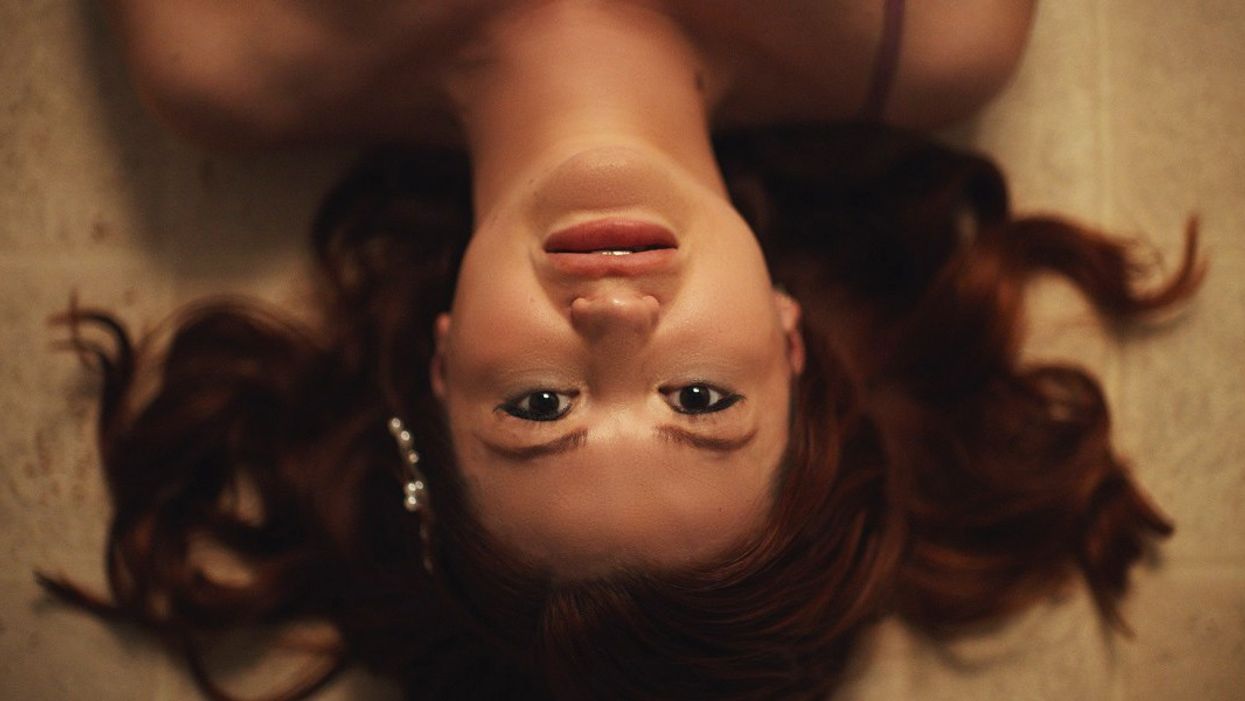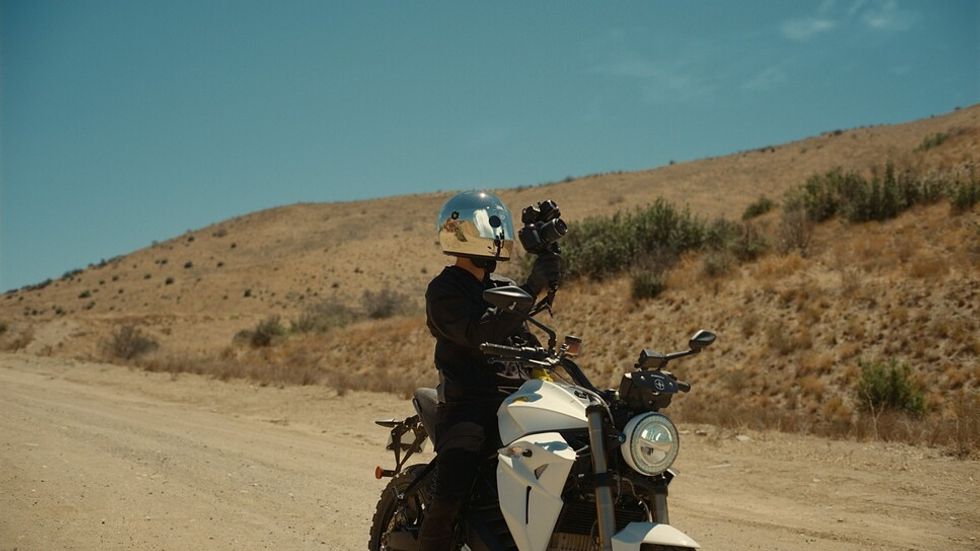Hey, Indie Filmmakers. You Don't Need Julia Roberts to Make Your Movie
Scrambled triple threat writer-director-lead on making your indie movie the way you want it to be made, balancing comedy and drama, and transparency in directing sex scenes.

Leah McKendrick in Scrambled
There's been something of a debate going on within the industry lately pertaining to the success of mid-budget comedies—are theatergoers still into the idea of seeing smaller comedy movies in the age of streaming?
I tuned in to a lot of discourse around this last year with Jennifer Lawrence's No Hard Feelings, and again this year with Shakespeare riff Anyone But You. Personally, I miss these fun, low stakes comedies. And with the release of Leah McKendrick's independent success story, Scrambled, there's another charming comedy movie in the zeitgeist in defense of this scale of comedy treat.
Scrambled is delightfully funny and wholly unique in its storytelling. Written directly from the heart of McKendrick's own experience freezing her eggs, she explores the loneliness of this procedure as a single woman in a way that hasn't quite been portrayed before.
No Film School was lucky enough chat with McKendrick about the process of getting this indie film off the ground, winning over Lionsgate on her terms, as well as directing both comedy and sex scenes.
Editor's note: the following interview with Leah McKendrick is edited for length and clarity.
How 'Scrambled' Went From Out-Of-Pocket, Self-Financed Indie To Lionsgate

Max Adler, Leah McKendrick, and Ego Nwodim in Scrambled
Lionsgate
I froze my eggs in 2021, and the only way that I could wrap my mind around spending 14,000 dollars was to write a movie about it. And I didn't feel that fire just yet. I was sort of just trying to make myself feel better about the fact that I had to spend this huge chunk of money out of pocket because my WGA insurance did not cover it.
I couldn't focus. I was in pain. I was feeling very dark and very lonely, and I would just sit on the couch feeling like a loser, and I would watch all these movies about fertility that were these married couples holding each other, trying to get pregnant, and I'm going, this isn't my story at all. This is actually making me feel worse. Where is the movie about a single girl doing this alone? All the scenes were like the husband getting ready to inject the woman, and she's freaking out. I have nobody here with me injecting me.
So I was resentful when I'm Googling, where is this movie? So I started writing scenes. I started taking notes thinking, okay, I need to capture this moment of rawness as it's happening. I get through the process and I get swept up immediately into my writing assignments, and it was about almost a year later, and I find out that Paramount had killed my two of my movies in one day.
Those were the light at the end of the tunnel because they were very close to production. One of them I was getting to direct as my directorial debut, and I was absolutely devastated. I was already running on empty. I was going assignment to assignment, which I know for a lot of screenwriters is the dream, and I get that, but it's a little bit careful what you wish for because you become a professional note taker. That's your life. Your life is not writing. It's rewriting and rewriting and rewriting. So I was already running on empty and then for them to kill the movie I was directing, and then a big franchise that I had was just, it destroyed me and I cried for a week. Then I got on a call with my team and I said, I am not going to succeed in this business if you do not give me a month to write my own story, and I need you guys to buy me some time with the overlords.
I need a month. I'm going to write that script about freezing my eggs. This was in April, and I'm going to shoot it this summer. I'll shoot it with my friends. I'll shoot it with my own money. I don't give a shit. I can't do this anymore.
Julia Roberts can only do so many movies in a year. You know what I mean? We're all waiting for Julia Roberts. That should be, I'm still waiting. That should be my biopic Waiting for Julia Roberts. The story of your life as a screenwriter. I just was like, I can't play this game anymore. I have to make my own movie. It had been since 2016. Now we're talking about 2022 since I had made a movie, and I'm like, nobody knows what I'm capable of because all I do is write scripts, turn them in, and then have them die a few months or years later. I can't do it anymore.
Thank God for my team was like, okay, write that script. Give us a couple months. We want to send it to some really legitimate places. And I was like, well, I'm not selling it, so don't even bother sending it to any studios. Send it to producers and tell them I'm writing, I'm directing, I'm starring. It's a non-negotiable, and I'm not taking notes. So, as you can tell, I was a demon.
I was in my demon era. I was at my lowest point, and I just was unwilling to play the game anymore. I felt like I had been so agreeable and I had worked my ass off to make everybody happy, and I still lost. So I was like, well, then I'm going to stop being Mrs. Nice girl, and I'm going to do it how I want to do it. So they got the script. They sent it around. I will tell you that more than one place tried to dissuade me from either directing or from starring or both.
And I was like, how many goddamn times do I have to say it's a non-negotiable? Do they not know what a non-negotiable is? It felt like a bait and switch. Everybody pumping me, oh, the script and the this and you, we love you Also, can you get the fuck out so that Julia Roberts can come in?
It's the story of my life. So I was just so over it, and I was like, this is why I'm willing to make it for two dollars with my friends, because at least nobody is telling me that I'm not good enough. Make the film the way I want to make it. Then came the producers at Mega Mix,. Producer Gillian Bohrer said she had never made a movie like this. She made La La Land. They made the Twilight Franchise. She comes from the studio side. She's like, I have never done this, but I'm down to learn. And Jonathan Levine used to make his films small, small, independent films is what gave him this huge career as a big studio director, and we believe in you and we're down to support you.
And thank God for them, thank God, because through the power of Mega Mix, we ended up getting money.
Because Mega Mix had a first look deal with Lionsgate, we showed it to Lionsgate. Gillian told them, just passed because we are already casting and we're shooting this in a few weeks. We already have the money. It's not a lot of money, but we have enough. We'd budgeted it. And I told 'em, I don't want to spend a dollar more than we need because that dollar I have to earn back. So let's just keep it. Let's all waive our fees. Let's make it tight and scrappy. That's the kind of filmmaking I come from, and that's the kind of filmmaking I believe in.
[Lionsgate finally watched it and] they gave us the money—more money than we had. They gave me what's called a negative pickup deal, which is a guarantee that they're going to pay us X amount of dollars.
Then you could take that and get a loan for that amount of money. So I got the best of both worlds. I got to make my film independently the way I wanted to, but I also had a built in big studio distributor on the other end of it. We submitted it to SXSW, obviously I'm an alum of SBSW, and they just got it and they saw it.
They also knew me and knew that this was my big swing as a director. We got to premier there, and then I went on strike, and then I came out of strike, and they were like, we're taking a big swing. Let's put it out in a big way, which is fully not what I ever expected to happen, and I'm just amazed. People tell me all the time, it's a miracle if any movie gets made, and it's unheard of that a movie of this size goes to theaters. So it's just likes all blowing my mind.
That is a very long story. Are you sick of me?
How to Craft Genuine Laughs As a First-Time Comedy Director
I mean, I grew up acting and I grew up in musical theater, but I kind of did it. Somebody asked me if I did standup ever, and I was like, I would never do that. That is never—I don't have that in me. I would cry the whole time. I would cry right off stage and cry if I bombed. But I think I just naturally, I love comedy. I love standup. I watch a lot of it. I consume a lot of it, and I do write a lot of romcoms. So in some ways it's in my wheelhouse, but I've never considered myself a comedy writer. So it's interesting that this is my directorial debut, and it's a comedy.
I think you hire incredible comedic talent because so many of my actors are these comedic heavyweights. They take the material, they elevate it. I try to create a set where the script is just a jumping off point. It's just a blueprint. I'm not Aaron Sorkin. You don't need to check the punctuation. It doesn't need to be perfect, but I just want you to capture the vibe of the character and then let's play. Let's find it.
Shifting From Comedy To A Heartfelt Monologue
I felt such pressure put on by myself because it was one of those scenes that I knew was going to be harder to tackle, to find that balance between the levity and the drama. You don't want to ever make light of something so heartbreaking, but also there is a lighter side to everything, and I wanted to really explore that and have Nelly kind of say the wrong thing at the worst time, and have it still be okay, and find this unexpected support from strangers that she's not really finding in her circle in real life.
And that was one of those moments, that monologue that was really hard for me to hold together because so much of it was my real life was the true story, my true story, my breakup. But I love when people reference it because it was one of the scenes that I was most afraid of and wasn't sure if I was going to be able to execute.
How to Direct Yourself In a Sex Scene

Leah McKendrick in Scrambled
Lionsgate
Yeah, it's a weird one, right? It's always going to be a weird one. I don't know if anybody just thinks it's like shaking a hand. I would say the implementation of intimacy coordinators is such an incredible new advantage as an actor and as a director, because they have those awkward conversations. They are there to ask, what are you comfortable with? We have all of these ways to protect you and to make you feel more comfortable.
You need help putting on this little sticky strip onto your genitals, all of that really awkward stuff. She gets in there. And I had done many nude scenes and sensitive stuff as an actor before this film, and I'd never had anybody like that. It was always the makeup department, and they were always lovely.
It was interesting to then be in the position, the director's position, and the actor, because I think I will say I felt very safe because everybody that is on that set I had a hand in hiring and choosing. So I felt very supported. And then it becomes, I want to make sure that my scene partner feels really supported.
One of my actors, he'd never done a sex scene before, and he was nervous. And in the past, to be totally honest, I would take a shot in my trailer with the other actor, but you can't do that as a director. We're so not taking shots with your actor. So suddenly I'm like, wait, I used to be able to get away with murder as just an actor. I'm getting topless. I can get somebody to go get me a bottle of vodka any day.
Now I'm like, oh, wow. I have to be really professional and well behaved. So I really feel like having an intimacy coordinator helped to me know what to say to my actor, what do you need? How can I help you? One thing that really helped me, and I would love to give this advice to other filmmakers, one thing that really helped me is discussing the scene with my actor as though they are also the filmmaker.
I would show them footage. I would get the monitor, I would show them, and we would see together, oh yeah, your should's in the way here. Oh yeah, I'm going to open up more this way. Oh, yeah, that's not really reading, because so much of it is technical. So much of it is okay. And when you pull them into the process, you show them that they are also, so their vision matters, their comfort matters.
Scarmbled is now playing in theaters. Catch it while you can!
- Secrets to Hollywood Editing Success Using Adobe Premiere Pro ›
- Olivia Wilde's New Movie Deal Just Made Hollywood History ›
- How Sandra Torres Granovsky Found the Dramedy of 'Scrambled' in the Edit ›
- What Every Filmmaker Should Remember About Publicity | No Film School ›
- Lionsgate Licenses All Its Movies and TV For AI Mining | No Film School ›
- How to Scale Video Editing With an AI Storytelling Partner | No Film School ›






















